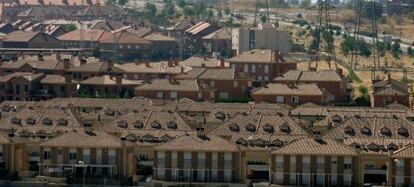Judge probes use of four fake Goyas to fund Madrid hospital
Project was canceled after police looked into authenticity of artworks, valued at €10 million

A company used four fake Goya paintings to raise funds to build a medical center specializing in spinal cord injuries west of Madrid, the public prosecutor has said.
Inversión y Explotación de Activos, SL produced an expert appraisal placing the collective value of the artwork at over €10 million, which was enough to persuade local authorities in the town of Villaviciosa de Odón to change its zoning plan to allow a former hotel to be converted into a specialized health center.
But the police launched an investigation after suspecting that the paintings might not be the work of the great Spanish artist. Four people are now under court investigation in connection with the case.
The paperwork revealed that the paintings were worth €300, €350 and €950, rather than several million
Inversión y Explotaciones de Activos, SL first approached local authorities in Villaviciosa, which is governed by the conservative Popular Party (PP), with a plan for the medical center in 2013.
The firm produced four supposed Francisco de Goya paintings and a report attesting to their authenticity written by an individual who purported to hold a PhD in art history.
The artwork was meant to guarantee a capital increase that would enable the company to build the center.
The project met with the approval of the Villaviciosa government team. “It represented a major opportunity in terms of jobs and business development,” said sources at the town hall. Workers were to be hired from a pool of local job seekers.
The site of choice was a former four-star hotel that had shut down. It was rezoned in order to allow for the new use as a medical center, but in December 2014, with the investigation underway, the plans were shelved indefinitely.
The Socialist municipal spokesman, Juan Carlos Bartolomé, recalled that “at the time that it was being discussed, everything seemed pretty strange, because there was already a hospital of this nature in Toledo and it was a very expensive project.”
The subsequent investigation revealed that the artworks were forgeries. EL PAÍS was unable to reach the company for comment, as it was liquidated in January 2014.
The National Police’s Historical Heritage Unit got particularly suspicious when the painting owners requested permission to take one of the works to Switzerland. It emerged that the other three had already been transferred to that country.
The paperwork showed that these three paintings were by an unknown author, and that their real value was €300, €350 and €950, rather than €3,528,000, €1,386,000 and €2,016,000 as stated by the alleged art expert, El Heraldo de Aragón newspaper reported.
The police got suspicious when the painting owners asked to take one of the works to Switzerland
When the artworks were shown to be fakes, the case moved to a Madrid court, which is now treating it as a case of fraud.
Sources confirmed that the judicial inquiry was nearing its end, after which the case will either be dismissed or a date set for trial.
Villaviciosa town hall has now noted that the project was a private venture and that the local government played no role in “any possible irregularities.”
The police have ruled out any fraudulent real estate operations and is instead focusing on the overvalued artwork.
English version by Susana Urra.
Tu suscripción se está usando en otro dispositivo
¿Quieres añadir otro usuario a tu suscripción?
Si continúas leyendo en este dispositivo, no se podrá leer en el otro.
FlechaTu suscripción se está usando en otro dispositivo y solo puedes acceder a EL PAÍS desde un dispositivo a la vez.
Si quieres compartir tu cuenta, cambia tu suscripción a la modalidad Premium, así podrás añadir otro usuario. Cada uno accederá con su propia cuenta de email, lo que os permitirá personalizar vuestra experiencia en EL PAÍS.
¿Tienes una suscripción de empresa? Accede aquí para contratar más cuentas.
En el caso de no saber quién está usando tu cuenta, te recomendamos cambiar tu contraseña aquí.
Si decides continuar compartiendo tu cuenta, este mensaje se mostrará en tu dispositivo y en el de la otra persona que está usando tu cuenta de forma indefinida, afectando a tu experiencia de lectura. Puedes consultar aquí los términos y condiciones de la suscripción digital.









































